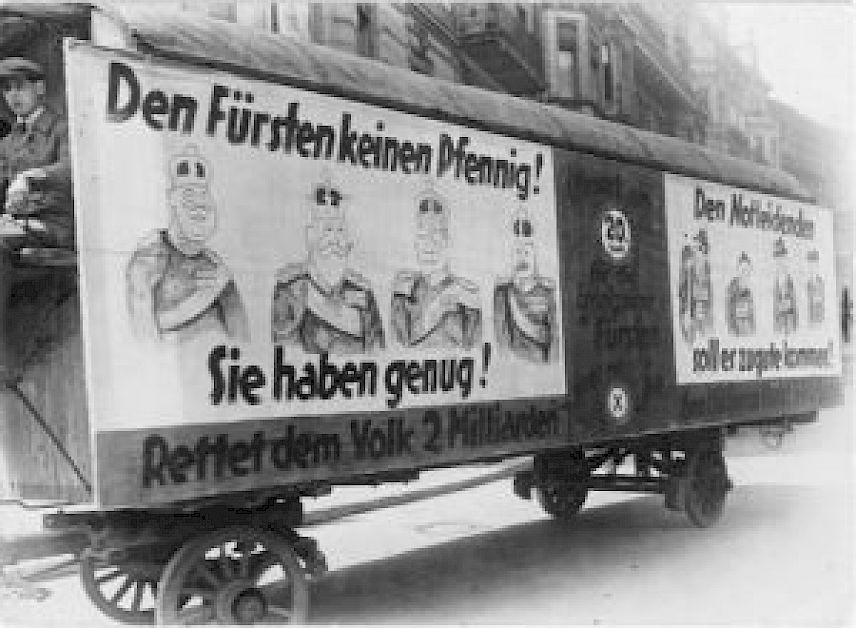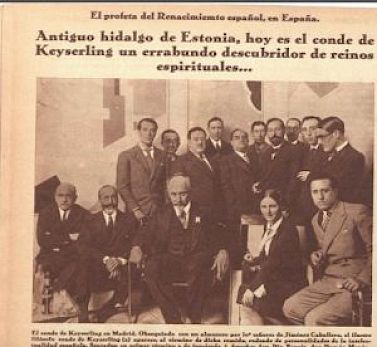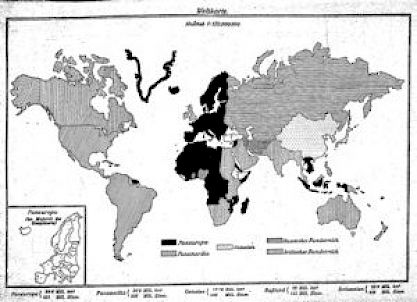Elites Connecting Eastern and Western Europe: An Interview with Dina Gusejnova

The beginning of the twentieth century was a turbulent period for Europe as it emerged from the First World War, with a revolution in Russia, the fall of the Austro-Hungarian, German and Ottoman empires, the abolition of many monarchies, and the rise of new nation-states. New actors and new ideas entered the political arena, radically changing the course of European history. How did the old imperial elites reflect on these changes, and how did they adapt to them?
Dina Gusejnova, a lecturer in Modern history at the University of Sheffield, looks into this unstable period through the eyes of German-speaking liberal intellectuals who belonged to the old and new nobility of Germany, Austria, and Russia. In her book, European Elites and Ideas of Empire, 1917-1957 (Cambridge University Press, 2016) she analyses how these German-speaking intellectuals used their old networks to call for a new Europe. This fascinating book provides a transnational history of the idea of Europe, linking histories of Germany and Russia, which are usually told separately, through the eyes of a cosmopolitan network of authors.
In our conversation, we discussed the place of the old nobility in the new world order. We also talked about transnational approaches to history and the importance of bridging isolated national historiographies, as well as the changing patterns of historical research in the last decade.
– Julia Klimova (University College London)
JULIA KLIMOVA: How did you become interested in intellectual history and this topic?
DINA GUSEJNOVA: This field has interested me since high school. I was inspired by my teachers of German and History, who introduced me to expressionist poetry written at the time of the First World War, and this is what eventually sparked my interest in German intellectual history. During my undergraduate studies in Cambridge, I also studied English political thought, which has a very prominent place there, but eventually I wanted to apply what I learned to German sources from the twentieth century.
KLIMOVA: How did your book, European Elites and Ideas of Empire come about? Was it something you have been working on for a long time?
GUSEJNOVA: I have been working on this material for probably 10 years. I started during my PhD and continued during my postdoc positions. I was originally interested in the question of social influence. I wanted to understand how ideas in a society gain traction through informal networks. Before this project, I had worked on an intellectual biography, but for the PhD, I wanted to concentrate on groups and social circles rather than individuals. My PhD supervisor, Martin Ruehl, introduced me to the diary of Count Harry Kessler, which I used as one of my main sources for contextualizing the diffusion of ideas in elite circles of European sociability. Historians have used this document for many different purposes before, but mostly in studies of the Weimar Republic. What interested me was its reflection of German elite milieux over a long period of time. Kessler mentions 40,000 names, most of whom were famous or relatively well-known figures from German and European society, who appear in the diary over a long period from the late nineteenth century to the early Nazi period. We often think of these periods as separate, but this document linked them through the lives of people who lived under two or three political regimes. It was a good starting point for exploring how political ideas form in the lifetime of a generation in changing social contexts.
KLIMOVA: The archival material that goes into the book is incredible. Can you tell me more about your research process?
GUSEJNOVA: It was a snowballing effect. I started with bigger and well-known archives, including government papers as well as personal collections in places like the Bundesarchiv in Berlin. In my case, many papers were concentrated in Germany. But I soon realized that the networks I was looking at were transnational, and their repositories were spread all over the world. Reconstructing elite social networks on the basis of Kessler's diary and other sources eventually took me to a range of destinations, including the International Institute of Social History in Amsterdam and the Hoover Library in California, both of which had systematically purchased a number of private and government papers from individuals fleeing various unstable political regions on the continent. I also examined archives in France, the Czech Republic, Italy, and Russia. The material in Moscow got there as a war trophy and included archives from key figures from the political and cultural elite of the Weimar Republic and interwar Austria. I also travelled around a number of libraries for rare book collections and ephemera. Looking back at it now, my work on this book was the last piece of research I did before the digital age transformed the foundations of our archival search quite dramatically – both the way we look for documents, and the kinds of documents we can find.
![Krieg und Zusammenbruch 1914/18 [War and Collapse 1914/18], frontispiece of a collection of letters from the war front printed and sponsored by Count Harry Kessler (Weimar: Cranachpresse, 1921). Krieg und Zusammenbruch 1914/18 [War and Collapse 1914/18], frontispiece of a collection of letters from the war front printed and sponsored by Count Harry Kessler (Weimar: Cranachpresse, 1921).](/site/assets/files/4299/picture2-201x300.350x522.webp) KLIMOVA: It is really fascinating how you take a holistic approach to Europe and link events that we are used to looking at separately: for instance, the assassination of the Russian royal family. To what extent do you think this approach helps us to understand history better?
KLIMOVA: It is really fascinating how you take a holistic approach to Europe and link events that we are used to looking at separately: for instance, the assassination of the Russian royal family. To what extent do you think this approach helps us to understand history better?
GUSEJNOVA: At the time when I started working on this subject, I felt that a lot of the historiography was still very nation-centric, even when covering topics such as the decline of multinational empires. By the time I was finishing the book, more master narratives had begun to appear that were establishing these connections. Nowadays, transnational perspectives on the aftermath of the First World War are a lot more prominent, but I often think that some distortions remain. You get books dealing separately with the Russian Revolution, the Weimar Republic, the rise of the Nazis. All this is plausible from a theoretical point of view, but when you look at the actual lives of people and social groups, you see how many people experienced several of these seemingly discrete events and regimes in their lives, and yet we compartmentalize these as if they were separate historical silos.
What I tried to capture in this book is the perspective of a segment of European society which was caught somewhat in between nostalgia for the old regime and enthusiasm for revolution. Given their social standing, they could speak freely about the mistakes of the old regimes, for instance when it came to the notorious war guilt question of the German empire in the First World War. In other respects, you might call these people old-fashioned liberals. They were fascinated by the revolutions of their time in a way in which early nineteenth-century intellectuals had been, even though some of them lost all of their possessions to it. They were fascinated in the way the revolutions were going to transform their society and Europe. One of the sub-groups I examine are intellectuals belonging to the German elite of the Baltic provinces of the Russian empire. These Baltic barons I looked at lost their wealth and status in the Russian Revolution, their life was threatened at times, and yet, in the particular cases I examined, it also provided some of them with new opportunities. One of these barons, Count Hermann Keyserling, became an international celebrity. In the interwar period, international audiences from Harvard to Madrid delighted in hosting this rootless Estonian baron, as he travelled the world and talked about the future of Europe. So, the Russian Revolution, much as it had harmed him materially, was in some ways beneficial for his career as a free-floating intellectual, to use Karl Mannheim's phrase. He talked about his new status of someone who lost his material wealth that used be a constitute of his identity and now focused on spiritual aspects. For others, the rupture provided by the revolution was more dramatic and brought an end to their careers.
In the German case, too, I was interested in the experience of people who were already quite critical of the old imperial regimes when the revolutions broke out in Russia and Germany. Their fears of the revolution were mixed with a curiosity about the opportunities that it offered to them personally and to Europe's future more generally. The bigger question in the background is why most western European states did not experience a rupture that was quite as radical as in Russia. Many people would not even call what happened in Germany in November 1918 a revolution. One of the themes I dwell on is the extent to which the German-speaking establishment incorporated partly positive attitudes to revolutionary change into its rhetoric. By talking positively about revolution, they seemed to create a kind of immunity among their contemporaries against a more extreme revolutionary sentiment. At the same time, I try to indicate that the experiences of the intellectuals I examine need to be put in the context of other uprooted groups and individuals. In the Baltic case, for instance, I looked at another German Russian subject, Alfred Rosenberg, someone who came from a middle-class background. After the Russian Revolution, he, too, moved to Germany, and became one of the earliest Nazi ideologues. In the last year before the Nazis came to power, he attended some of the same events which were also frequented by old diplomats from Austria-Hungary, such as a congress about the future of Europe hosted by the fascist party in Rome in 1932. I am fascinated by the close social proximity of people from a variety of social and ideological backgrounds in periods of transition, people who are then subsequently often treated in very different historiographical narratives.
 Election poster 'Not a penny to the princes!''Den Fürsten keinen Pfennig! Sie haben genug! -rettet dem Volk 2 Milliarden Den Notleidenden soll es zugute kommen!' [Not a penny for the Princes! They have enough! – save 2 billion for the people/ It should benefit those in need!]. ElectionKLIMOVA: How did you select which individuals to focus on?
Election poster 'Not a penny to the princes!''Den Fürsten keinen Pfennig! Sie haben genug! -rettet dem Volk 2 Milliarden Den Notleidenden soll es zugute kommen!' [Not a penny for the Princes! They have enough! – save 2 billion for the people/ It should benefit those in need!]. ElectionKLIMOVA: How did you select which individuals to focus on?
GUSEJNOVA: Using Weber's notion of an ideal type, one could say that I was choosing individuals who fit one model which had been identified by the Austrian poet Karl Kraus, a very perceptive literary critic from my period. He coined the term "aristocratic writers" to describe a social type which seemed to him to be characteristic of his age, during the end of Austria-Hungary: aristocrats who had turned their status as declassé representatives of the old regime into a source of charisma. I did not have the aspiration to present elite milieux as a whole, but rather this particular social type who was visible within them. Within that group, I looked at aristocrats of different status: old European nobility from Austria and Bohemia; the Baltic barons, that is, old families most recently serving the Romanoff dynasty, but tracing their roots back to the crusaders; then some recently ennobled personalities like the Prussian Count Kessler, the son of a banker. I found that the left wing of that group was connected to communists – for example, Kessler sponsored a communist publishing house – while on the conservative end, some of my protagonists sympathized with the Nazis. Together, they bordered on quite a range of different social groups and ideologies.
KLIMOVA: You mention that it is a group of people who had the most to lose, but it appears from the book that they actually managed to adapt well to the new Europe. What about the elites who did not adapt to the changes in Europe?
GUSEJNOVA: Of course, if one looks at aristocratic families as such, not a particular group of intellectuals among them as I do, you will find a large number of people who moved to the right and did not adapt to modernity. Some tried to safeguard their status by aligning with the Nazis, or conserving themselves in other ways, like the "white" Russian émigrés, who ended up creating conservative organizations, which offered a nostalgic view of the past and failed to set up something comparable to a government in exile. One of my case studies, the Baltic Baron and international lawyer Mikail von Taube, was one such case. This is a big contrast to the exiled governments of Eastern Europe, such as Poland or Czechoslovakia, who tried to look forward beyond their own situation.
KLIMOVA: It appears from your book that Taube actually finds a new role in society, for instance, in offering genealogical services to German families from the Baltics. By contrast, Nabokov, for example, stated that in 15 years of living in Germany, he did not read a single German newspaper, and did not even feel inconvenienced by never speaking German. Do you think Taube is more of an exception within the Russian émigré community?
GUSEJNOVA: Yes, I agree about the contrast, and this was actually one of the struggles I faced writing the book – finding characters who were interesting in their own right, yet sufficiently representative of that ideal type we were discussing. In the case of Baron Mikhail von Taube, an international lawyer who had shaped the institutionalisation of international arbitration at the Hague on Russia's behalf, I wanted to use him to represent a group of the Baltic intelligentsia that were important in the administration of the Russian empire. They were German-speaking, and thus being in exile in Germany was not as alienating to them as to Nabokov, an Anglophile and a Francophone. We often separate Russian and German history in this period. At most you end up with a comparative history of Nazism and Stalinism. There are some exceptions, of course, such as studies of the Eurasian movement, or how Russian émigrés reacted to the Nazis. I found that looking at the German-speaking elite of the Russian empire provides a different insight into the social connections linking these two empires and their successor states. Taube ended up in "exile" not from Nazi Germany but had come to Nazi Germany and German-occupied Paris fleeing Soviet Russia.

KLIMOVA: So, your main characters in the book, as we have established, managed to embrace the new Europe. Yet they seem to remain quite nostalgic about the past, for example, in glorifying the Middle Ages. How do you think these feelings ended up coinciding in them?
GUSEJNOVA: I think many of my protagonists believed that one can learn from the past. Kessler, for example, was a supporter of guild socialism, and was acquainted with like-minded people in the United States, France and Britain, for instance British guild socialists. According to Kessler, his contemporaries, who were working out a new constitution for Germany, as well as working on the League of Nations, could learn from the way Europeans had organized society in the Middle Ages, including elements of communal organization of economic and social life. He thought these aspects could be used to modernize and shape contemporary life and corporate self-organization. For Taube, the Middle Ages meant something completely different. He focused on the Byzantine period and argued that this was the high point in the history of international relations in which he saw the Church as well as the practice of Roman law as fundamental aspects for international order. Richard Coudenhove-Kalergi, the founder of the Paneuropean Union, mobilized ideas from the Enlightenment, including masonic and ecumenical principles, to forge connections across party political divides. However, by the mid-1930s many of these people realized that they had failed to inspire any lasting political institutions. Their work was eclipsed by much more powerful – if ultimately not very durable – ideologies.
KLIMOVA: When do you think the political relevance of your characters fades in European political life?
GUSEJNOVA: They gradually become more and more disconnected from current political affairs and institutions. For many of them this happened around the time of the rise of the Nazi regime. As fascism and National Socialism become more dominant ideologies in state-building in their lifetime, their own work became less viable. Most of the authors I look at end up in one form of exile or another and become memoir writers by the late 1930s or the mid-1940s.
KLIMOVA: Does the next generation pick it up?
GUSEJNOVA: Some of the ideas I discuss experienced several revivals after the Second World War. Richard Coudenhove-Kalergi, the propagandist of the idea of a Paneurope, was prominently cited by Winston Churchill as well as the architects of Franco-German rapprochement in the late 1940s and early 1950s. His vision of Europe remains the most famous and is regularly reprinted. But I think impact and success is not the only reason for investigating their lives: I am equally interested in the mechanics of their failure to remain well known or influential.
When people like Robert Schuman, Alcide de Gasperi and others started working on European economic integration in the postwar period, they fostered ties between the industrial and financial elites and the cultural elites of Europe in a way that had already been done by people like Coudenhove-Kalergi or Karl Anton Rohan. Such connections were previously the work of supra-political movements such as Coudenhove-Kalergi's Paneurope, though not exclusively.

KLIMOVA: It is interesting how you integrate the history of the Russian Empire into the wider European context through a focus on the Baltic region, which was, to an extent, marginal to Russia. You argue generally how movement and displacement, whether voluntary or involuntary, gave rise to Europe as a common identity and shared space. The history of the Russian exile community seems to be part of this story. And yet after the Revolution, Russian history is increasingly treated as a separate entity. How do you explain that?
GUSEJNOVA: This is more of a sociological question, because studies of Russia in the West have really been affected by a Cold War ethic. Understanding Russia meant "knowing your enemy". This doesn't mean that some historians of Russia hated it. Far from it, generations of historians have been enchanted to some extent by the Bolsheviks announcement that the Soviet Union is a completely separate project, a new page that has no connection to the past. Clearly, some features of this new state were innovative, but others were not. Eastern European and Russian history have for a long time been separated geographically from studies of modern European history and it is time to connect them again.
KLIMOVA: Despite the geographical distances, both physical and metaphorical, you have conducted research in many countries for your book. Do you notice differences in perception of this part of history, for instance, between Western and Russian approaches?
GUSEJNOVA: Over the ten years that I have been working on the book, a whole new generation of scholars has emerged in Russia, and there has definitely been an increase in collaborative studies, a cross-fertilisation of ideas and approaches. Older generations of Russians tend to think in concepts such as "home", "abroad", "émigré" and so on. Also, much current work in Russia is motivated by the political situation, the rise of authoritarianism, etc., which drives historians to ask more direct questions about the past. For example, I contributed to a Russian online magazine that was founded at the wake of the Ukrainian crisis. Writing about the First World War in that context felt quite different than doing so for an English-speaking audience. I felt it gave my historical investigations more vitality. Another thing that has become strikingly different is, of course, the opening of archives. Despite this, scholars in Britain, France, and the US still work differently. There are more established structures of communication and peer review. I have the impression that people tend to read and review each other's works in a much more systematic and disciplined way than their Russian colleagues, many of whom concentrate on their own reputation or the cultivation of stars.
KLIMOVA: What would you like your next project to be?
GUSEJNOVA: I am still interested in the social history of ideas, but this time I am looking at ideas of citizenship by social theorists from Central Europe who were forcibly displaced or went into exile in the Second World War. I am doing a group portrait of a range of socialist and broadly cultural theorists, who were interned as so-called "enemy aliens" in the Isle of Man. I want to see how the experience of displacement and internment, and the peculiar ephemeral cultural life that this produces, changed their ideas and approaches to understanding society.